The financial sector, which is undergoing a significant change right now, is significantly impacted by Artificial Intelligence (AI). Artificial Intelligence (AI) can be likened to a technological wizard that helps financial institutions such as banks operate more efficiently. It all comes down to Artificial Intelligence’s capacity to process enormous amounts of data, spot hidden patterns, and make deft judgment calls that are revolutionizing the sector.
Artificial Intelligence is brilliant because it can automate repetitive and laborious activities, dramatically increasing accuracy and speed while saving banks substantial money. With time, artificial intelligence software development started getting a lot of limelight as companies wanted to synchronize AI in their working systems.
What is AI in Banking?
Financial institutions can profit from digitisation and increase their competitiveness by leveraging cognitive technology and artificial intelligence (AI) to enhance their competitiveness. An AI system may finish anti-money laundering operations in seconds instead of hours or even days in the past.
Thanks to artificial intelligence, financial institutions can now handle massive volumes of data at breakneck speed to mine it for insightful information. A higher degree of service can be provided to more consumers by utilizing features like digital payment advisors, biometric fraud detection tools, and fake intelligence bots. As a result, profits will rise, expenses will drop, and income will increase. As mentioned above, banking; financial software development can help financial institutions with their best services.
AI Use Cases in Banking- stats and figures
Artificial Intelligence (AI), which has enormous unrealised potential for wealth creation, is transforming the banking and finance industry. It is crucial to remember the following: The global market for generative artificial intelligence in banking and finance is projected to reach $12,337.87 million by 2032, growing at a steady rate of 33% throughout the 2023–2032 forecast period. The market was estimated to be worth $712.4 million in 2022.
Additionally, based on alternative research, the Artificial Intelligence in Banking Market—valued at $5.13 billion in 2021—is expected to reach $64.03 billion by 2030, growing at a consistent rate of 32.36% between 2023 and 2030.
The application of artificial intelligence technology in the international banking industry has the potential to create an extra trillion dollars in value yearly, according to estimates supplied by McKinsey. Furthermore, Deloitte predicts that the top 14 global investment banks will be able to use generative artificial intelligence to increase their front offices’ efficiency significantly. Productivity gains of between 27 and 35 per cent could come from this. This could lead to an approximate $3.5 million boost in revenue for each front-office employee by 2026.
Role of AI in Banking and Finance
In this section we will know about the role of AI in banking and finance sector and the numerous causes that have led to AI’s revolutionary impact in this business. The AI software development solutions can help businesses in the finance sector in their daily processes. Let’s have a look at the role of AI in banking and financial institution below:
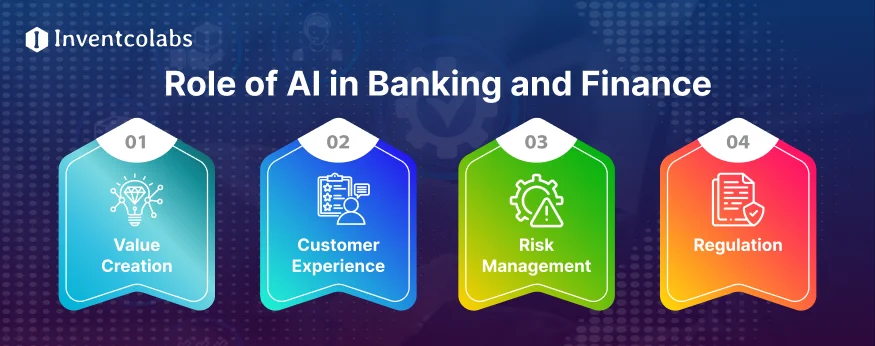
Value Creation-
Artificial intelligence technologies hold great banking and finance business potential. These technologies might be applied to unlock up to one trillion dollars annually. This value generation is fueled by artificial intelligence’s ability to personalize customer services, eventually improving profitability. AI in banking software development also minimizes error rates, maximizes resource utilization, and lowers operating costs—all supporting value creation.
Customer Experience-
The enhancement of the client experience is the primary goal of artificial intelligence’s impact on banking and finance. Artificial intelligence-driven systems can tailor recommendations, data, and services to the unique preferences of individual users, providing a previously unattainable degree of customization. As a result, this raises customer satisfaction levels and generates innovative value offerings.
Risk Management-
Artificial intelligence (AI) has many advantages but raises new issues. Financial organizations that use AI must negotiate the existing regulatory frameworks to manage these risks effectively. Modifying risk management protocols to identify and address AI-related hazards when dealing with an AI-driven environment is imperative.
Regulation-
Regulatory compliance must be carefully considered when integrating artificial intelligence into financial services. Financial app development must incorporate AI-powered processes into the existing regulatory frameworks. For example, organizations that offer financial advice must ensure that it remains appropriate for clients while adhering to legal requirements.
Benefits from AI integration to banks to accountants
Artificial intelligence has many broad advantages for the accounting industry, revolutionizing traditional accounting practices. Among the benefits are:
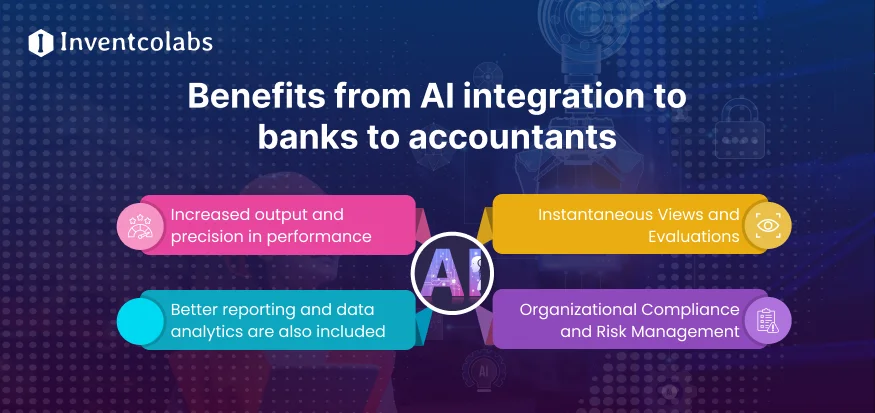
Increased output and precision in performance-
Artificial intelligence has enabled accounting experts to automate monotonous tasks, allowing them to concentrate on strategic roles and optimize their value.
Better reporting and data analytics are also included-
Artificial intelligence (AI) can be used to thoroughly understand the financial industry by analyzing vast amounts of financial data to find patterns and insights.
Instantaneous Views and Evaluations-
Artificial intelligence’s ability to interpret data in real-time guarantees that organizations can access the latest financial data, allowing them to make informed decisions swiftly.
Organizational Compliance and Risk Management-
Artificial intelligence aids in risk management and regulatory compliance by proactively identifying and resolving abnormalities in a constantly shifting regulatory environment. A new era of improved strategic financial management and increased efficiency has begun, and the advantages of artificial intelligence show how revolutionary its influence has been on traditional accounting.
Use Cases and Real-world examples of AI in banking
Here are several instances of actual financial organizations fully utilizing artificial intelligence for their gain.
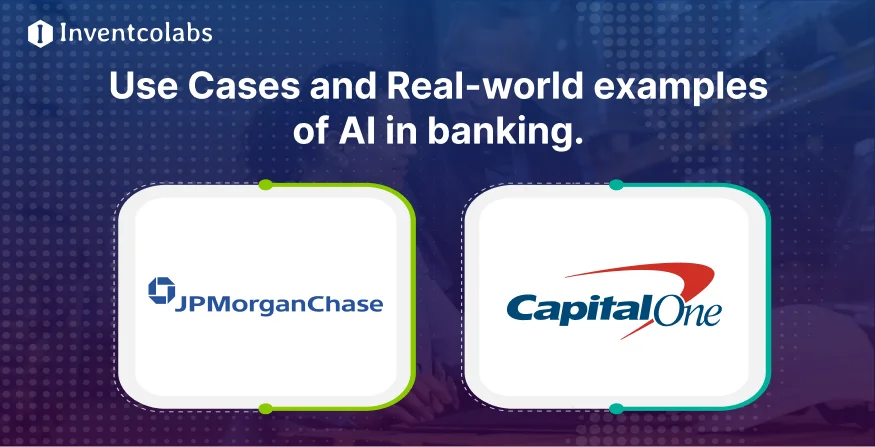
JP Morgan Chase:
Using artificial intelligence and deep learning techniques, JPMorgan Chase researchers have created an early warning system that can identify malware, trojans, and phishing scams. JPMorgan Chase developed this system. Researchers have calculated that it takes a trojan 101 days to infiltrate an organization’s networks. The early warning system gives enough notice before the attack happens. Furthermore, it alerts the bank’s cybersecurity team if hackers start sending phishing emails to staff members in an attempt to compromise the network.
Capital One:
The most well-known application of artificial intelligence (AI) in personal banking is Capital One’s Eno intelligent virtual assistant. Virtual card numbers are another tool Capital One and Eno use to prevent credit card theft. They are now working on a project called Computational Creativity, which aims to teach computers how to be imaginative and explicable.
Explore more: How to Develop AI Tools Like ChatGPT?
Challenges for adopting AI & ML in banking
Artificial intelligence’s challenges to finance and accounting become evident upon integration and demand close examination. Among these are:
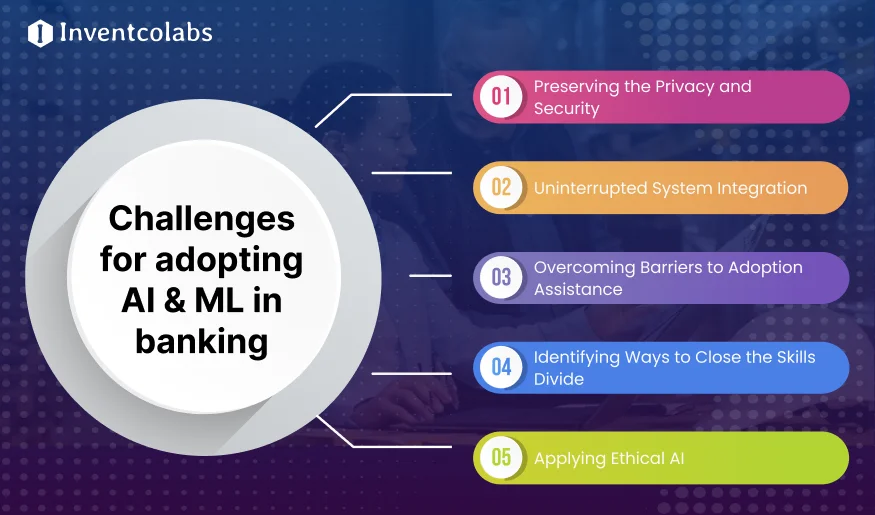
Preserving the Privacy and Security –
Confidential financial information security requires strict measures to stop unwanted access and defend against cyber threats.
Uninterrupted System Integration-
Careful planning is necessary to create a harmonious blend and guarantee data consistency when integrating artificial intelligence with legacy systems already in place.
Overcoming Barriers to Adoption Assistance-
It’s possible that people won’t embrace AI installation, in which case careful change management strategies would be needed.
Identifying Ways to Close the Skills Divide-
It is imperative to close the knowledge gap in artificial intelligence bookkeeping and accounting to leverage AI’s possibilities fully.
Applying Ethical AI-
To ensure fairness and openness, it is critical to respect ethical standards in the algorithmic decision-making processes of artificial intelligence.
Future Of AI In Banking And Finance-
Implementing AI in banking software development is nothing less than revolutionary action. This section provides a thorough examination of the trends and projections that are anticipated to change the financial industry’s landscape. Let’s know about the future of AI in banking:
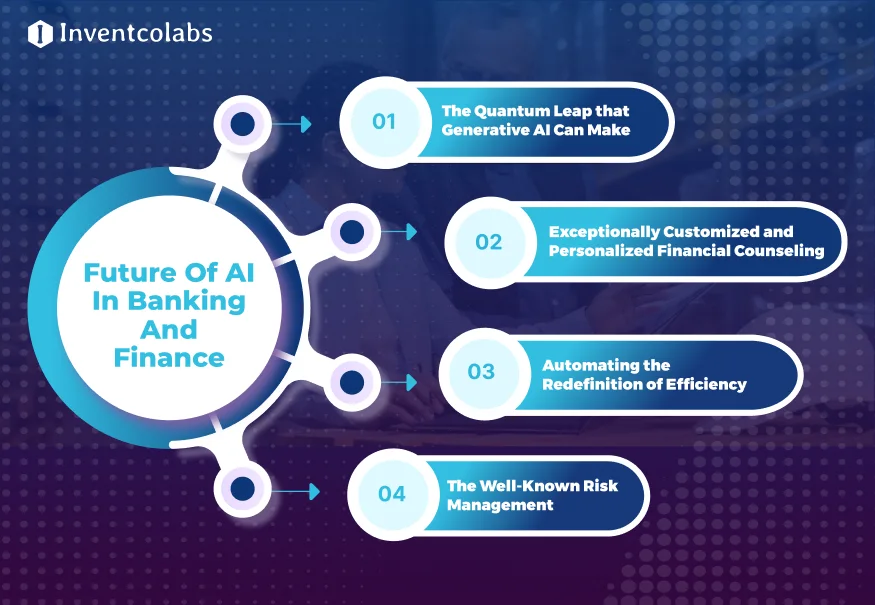
The Quantum Leap that Generative AI Can Make-
Large language models (LLMs), a hallmark of generative artificial intelligence (AI), are being used by banks rapidly. These artificial intelligence (AI) machine learning and natural language processing-powered natural language machines (LLMs) are incredibly adept at understanding user queries and responding with responses that resemble a human’s. Their impact is expected to be even more revolutionary than the internet’s initial debut. Potential applications include optimizing data analysis and streamlining client interactions through a more efficient method.
Exceptionally Customized and Personalized Financial Counseling-
Artificial intelligence will be able to offer highly personalized financial advice in the future of finance. Artificial intelligence will assist financial services software development services in finding new revenue streams and recommending products. Think about working with a financial advisor who is well-versed in your particular financial situation, as well as your objectives and risk tolerance. This person will be able to give you precise information that will enhance your customer experience and encourage you to stick with them.
Automating the Redefinition of Efficiency-
Automation—which is made possible by artificial intelligence significantly reduces expenses. AI software development solutions play a significant role in boosting operational effectiveness. Both sophisticated back-office procedures and customer service encounters can be automated with this automation. Banks’ resource allocation will become more judicious, leading to higher productivity and a more robust competitive edge.
The Well-Known Risk Management –
The application of artificial intelligence to risk management is constantly growing. It gives financial institutions a thorough understanding of potential risks, empowering them to take proactive steps to reduce risk and make well-informed decisions. Future developments could lead to even more advanced risk assessment, guaranteeing resilience in a constantly changing financial environment. Many reputed AI software development companies will help you create the desired financial institution system.
How to implement AI in Banking?
This section will look at the steps banks can take to modify their operations and widely apply AI, with due consideration given to the four critical elements of people, governance, process, and technology. After observing the application of AI in banking, we will move on to the following domain.
How do you become an AI-first institution with your bank?
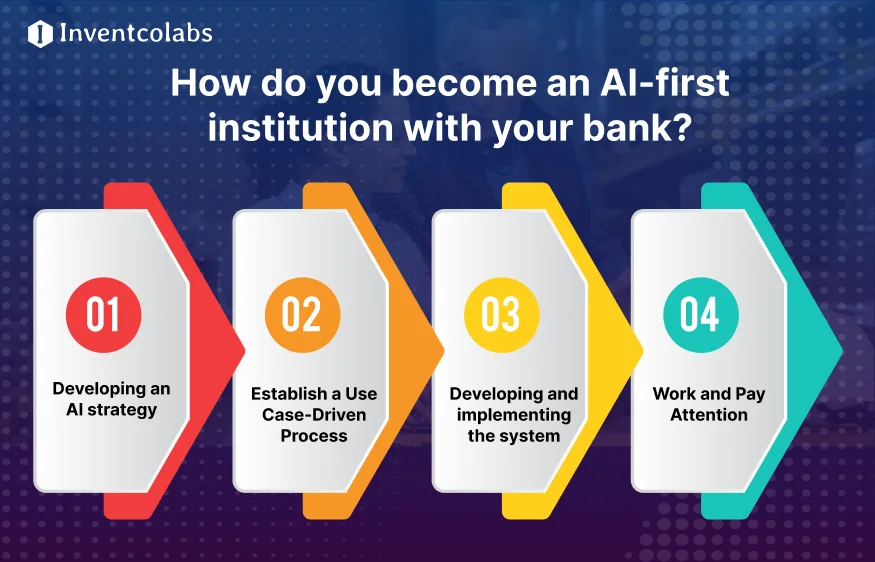
Developing an AI strategy –
The first step in implementing artificial intelligence is developing an enterprise-level AI strategy considering the business’s goals and values.
It is imperative to do internal market research to pinpoint gaps in personnel and workflow that artificial intelligence technology can bridge. Ensure the AI plan complies with the industry’s unique standards and regulations. Financial organizations can also assess the latest global industry standards.
To ensure that the bank’s numerous functional divisions adopt artificial intelligence with clear guidance and directions, the last step in developing an AI strategy is to improve internal procedures and policies related to people, data, infrastructure, and algorithms.
Establish a Use Case-Driven Process-
The next step is to ensure the bank’s goals and operations align with selecting AI prospects with the most significant potential value. Furthermore, financial institutions must determine the extent to which AI banking software development solutions must be integrated into their newly updated or current operational procedures.
After deciding which artificial intelligence applications could be used in banking software development model, the quality assurance team should assess the viability of the apps. They must look into every aspect and identify the areas where performance is deficient. They must select the scenarios that make the most sense in light of their assessment.
Creating an artificial intelligence talent map is the last phase of the planning process. Banks need experts like data scientists or algorithm programmers to develop and implement AI based software development Solutions. If they lack the necessary staff experience, they can either outsource the work or collaborate with a technology supplier.
Developing and implementing the system-
After planning, the strategy’s implementation is the next step for banks. Before building an artificial intelligence system from scratch, they must build prototypes to grasp the limitations of the technology. To test the prototypes, the banks must first collect the relevant data and feed it into the algorithm.
Accurate data is necessary for the artificial intelligence model, which is taught and developed using this data. Once the AI banking software design is developed and ready, banks must test it before they can comprehend the results. If the development team does a similar trial, they will better grasp how the model will work in real life.
The last step in the procedure is to put the trained model into practice. Upon completion of the deployment, production data will start to flow in. As more and more data starts to stream in, financial institutions will be able to update and improve the model regularly.
Work and Pay Attention-
AI banking software development services need ongoing calibration and monitoring to be implemented successfully. Banks must create a review cycle to thoroughly analyse the AI model’s operation. As a result, this will help financial institutions maintain excellent operational execution and manage cybersecurity threats.
During the operating stage, the artificial intelligence model will be impacted by the continuous inflow of fresh data. Financial institutions should take the appropriate actions to ensure the dependability and correctness of the input data.
Conclusion
Introducing Artificial Intelligence (AI) into banking & economic software development is shifting significantly toward higher efficiency, customer-centricity, and innovation. This is not a fad that will fade away. Reputed banking app development companies are at the forefront of this revolution. These businesses focus on AI development services and offer essential support for using AI’s potential to drive business expansion.
Explore more: Mobile Banking Application Development: How to Create Mobile Banking App?
FAQs
Q. In the accounting domain, what challenges does artificial intelligence encounter?
ANS. Artificial intelligence has several challenges in accounting, such as the need for ongoing improvements, the cost of implementing new technology, the potential for biases in programming, and data security.
Q. Is it sensible to automate accounting completely?
ANS. Routine accounting operations can be automated, but jobs requiring analytical and interpretive skills will always require human accountants.
Q. What benefits may customers expect from a bank that puts artificial intelligence first?
ANS. Clients of banks that prioritize artificial intelligence may expect more personalized and efficient services and more sophisticated financial tools and insights driven by state-of-the-art AI technology.
Q. What are the most crucial phases in transitioning from a traditional bank to an AI-first bank?
ANS. To make the shift to become an AI-first bank, a bank must invest in artificial intelligence (AI) technologies, data analytics, employee education, and the implementation of AI-driven initiatives to transform banking services and customer experiences.





